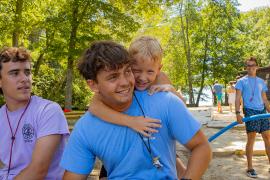The COVID-19 pandemic has tested the resilience in each of us. Years of studies around resilience reveal that the quality of our relationships when we are young, especially with parents and caregivers, plays a crucial role in how we manage difficult situations later in life. As we learn and grow as young people, we develop resilience tools such as optimism, cognitive and emotional flexibility, and social connectedness. In good times and bad, it’s important to help parents, educators, and especially campers understand how camp experiences help us forge greater emotional resilience.
Over these past two COVID-19 summers, informal interviews with camp directors have overwhelmingly pointed to a dearth of emotional resilience among their campers, staff, and perhaps even themselves. After months of traumatic isolation and disrupted lives, everyone’s tolerance for differences, uncertainty, change, and challenges has worn thin. Fortunately, the positive risk opportunities in emotionally and physically safe, immersive camp experiences help people of all ages build emotional resilience by nurturing in them a growth mindset and helping them reframe fears and challenges into valuable learning experiences.
When we are stressed out, our brain’s amygdala, which is responsible for instinctive and impulsive responses, recognizes the threat and sounds the alarm. Then the prefrontal cortex, the emotional “control tower” in our brain, determines if the alarm is justified and signals the amygdala. When we have developed emotional resilience, we are able to access our prefrontal cortex and calm our amygdala. Camp experiences help improve our capacity to regulate our emotions.
Even camp professionals’ outlook and attitude can easily be affected in these hard times. Our own self-perception can be diminished, especially when we are isolated for prolonged periods of time. Fear, worry, and anxiety gnaw away at our sensitivities. Even the most emotionally intelligent among us are not unaffected. While we may appear outgoing and confident, we can be inwardly hyper-vulnerable to the smallest of comments from our peers and have a diminished capacity to artfully manage our insecurities without the help of a thriving camp community steeped in a culture of healthy relationships, optimism, and caring.
Immersive day and overnight camp experiences foster a reservoir of emotional resilience in children, youth, and young adults by providing a community where they feel safe enough to take risks and we help them learn to problem solve for themselves (with lots of encouragement). All young people are naturally drawn to risk-taking as a normal part of growing up. Controlled, positive risk-taking is a tool that enables them to test their comfort zones and develop their identities. At camp, everyone is supported in trying new things, especially hard things — and learning from mistakes is celebrated. Campers playfully working to solve problems collaboratively with their friends is encouraged. And young people can rely on support from their peers and caring counselors to process through fears and strengthen coping skills. Overcoming fears in this way causes positive changes in the prefrontal cortex that will help protect against the negative effects of future stressful events. These changes can also spur a healthy predisposition to curious learning, self-confidence, and growth mindset.
The pandemic’s silver lining is that it reinforces the value of camp for all young people. Camp helps them engage in a thriving community where they belong, feel valued, and learn to lead and grow. Camp truly is a vital developmental and educational experience. So we must do all we can to expand equitable access to camp experiences for all families.
Reference
Zimmerman, E. (2020, June 21). What makes some people more resilient than others. The New York Times. nytimes.com/2020/06/18/health/resilience-relationships-trauma.html



